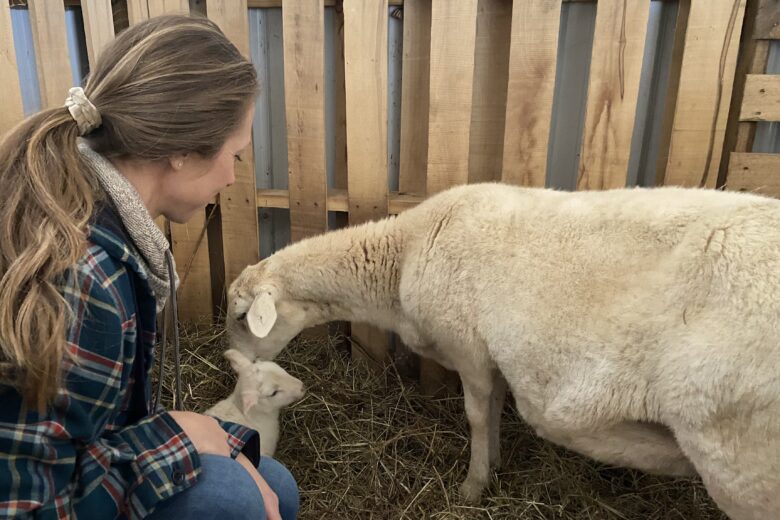I expected exactly the opposite.
I had thought living on a farm would make me despise the coming of cold weather, but while the world is in a season of fa-la-la-frenzy, the farm is far slower. Tractors aren’t roaring across the fields, and even the bees are nestled all snug in their hives. Without fields to mow, gardens to tend, or leaves to move, we can play catch up with the slower-to-rise sun.
The other morning, I sipped coffee and watched Wade’s long strides from the barn. He was carrying frozen chicken waterers in each hand. Halfway to the house, he stopped and peered over to the pasture. I knew that meant today would be a sheep day: moving them to fresh grass, trimming hooves, or maybe cleaning their shed.
After Wade and our oldest mucked the barn, my youngest and I were to cover the floor with dry straw. Zelie, one of our first ewes and my favorite, walked with me step for step. She stomped her approval of each toss of bedding and kept her nose in my pocket searching for pretzels. I sent my son for some sweet feed and sat down to wait. It was almost cozy. Almost, except the straw had scratched and cut my hands, cold cobwebs decorated every corner, a mouse darted behind a stall door, and Zelie messed in her fresh shed.
It was a sort of epiphany: that’s how it would’ve been for the Holy Family. Dirty and dank.
The boys both returned for the last chore. Pushing back impatient, fuzzy heads, they poured the feed into the manger.
I like to imagine how Mary told the story of Christ’s birth. Perhaps a chill in the air reminded her of that cold, glorious night. Maybe they sat around a warm stew she had prepared, the apostles—especially Matthew and Luke who would later write about it—attentive to the details of Mary’s Son before any of them knew Him.
With a gentle smile, remembering her baby’s tiny, divine fingers and toes, “And then I wrapped him in swaddling clothes and laid him in a manger.”
God of the Universe. The Messiah. My Lord… in rags.
A few verses later, St. Luke recorded the words of the Angel Gabriel as he appeared to some shepherds. “For to you is born this day in the city of David a Savior, who is Christ the Lord. And this will be a sign for you: you will find a baby wrapped in swaddling clothes and lying in a manger,” (2:11-12).
The shepherds rushed to adore Jesus and found Him just as the angel had said.
It’s not lost on me that the Gospel of Luke emphasizes Christ’s crib three times. It’s like he’s trying to underscore God’s humility and the significance of Mary introducing the world to her baby from such an odd platform.
O, little town of Bethlehem, it’s a curious name that translates from Hebrew to “House of Bread.” It’s the hometown and place of King David’s anointing, where the silent stars proclaimed the holy birth of the One who was foretold from the beginning: the Good Shepherd, the Lamb of God, Emmanuel… God with us, not on a throne, but in a dirty food trough.
The world expected exactly the opposite.
The people of Jesus’ day expected a warrior-king to come in, sword-swinging, and return Israel to power. Instead, the baby that needed a mother to nurse Him was the Salvation of all. Later, in the Gospel according to St. John, Jesus is grown and declares not once but three times, “I am the bread of life,” (6:41, 48, 51).
It was hard teaching. One asked, “Is this not Jesus?… Do we not know his father and mother?” (6:42).
I hope we do. I pray we know the Good Father, the Blessed Mother, and Jesus… God who came from Heaven to be born in Bethlehem and to die on the Cross in Calvary. God who continues to perform miracles and is truly present—body, blood, soul, and divinity—in the Bread of Life, the Holy Eucharist. In the 5th century, St. Cyril of Alexandria explained, “The setting of Christ’s birth points us to the Eucharist. Since through sin man becomes like the beasts, Christ lies in the trough where animals feed, offering them, not hay, but his own body as life-giving bread.”
It is hard teaching; one I’m not able to fully understand or explain. Then again, would man ever worship a god that was within the limits of human comprehension? It’s why I love how the Catholic Church calls it a “mystery of faith.”
Christ is not at all what we expected, but the best gifts never are.
